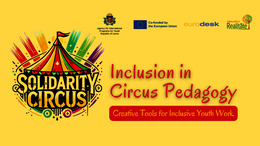Toolbox — For Training and Youth Work
All new tools in your inbox: Be the first to know about new tools for learning with our e-mail notifications.
Exercise
Toolkit "Inclusion in Circus Pedagogy"
Toolkit "Inclusion in Circus Pedagogy" created in the frame of Erasmus+ training course "Solidarity Circus 2025" in Riga, Latvia
Aims of the tool
Aim: To provide accessible,
low-resource, and impactful tools for youth
workers based on social circus methods
Description of the tool
Non-formal SOCIAL CIRCUS methods of circus pedagogy to use with youth to support inclusion, with low-resources, even in war-conflict or low-internet regions, so it can be printed and used in the field.
Methods helps youth — especially those who struggle with verbal expression — to build trust and connection through body language. For many young people, mastering a physical skill boosts self-esteem and shows progress through repetition.
Available downloads:
Disclaimer
SALTO cannot be held responsible for the inappropriate use of these training tools. Always adapt training tools to your aims, context, target group and to your own skills! These tools have been used in a variety of formats and situations. Please notify SALTO should you know about the origin of or copyright on this tool.
Tool overview

http://toolbox.salto-youth.net/5113
This tool is for
This toolkit captures practical methods and reflections that emerged from the training, with a special focus on supporting youth with fewer opportunities, including those from conflict-affected regions or low-internet regions or disadvantaged background
and addresses
Social Inclusion
It is recommended for use in:
Youth Exchanges
Materials needed:
This is a toolkit for a low-resources activities.
For some methods no materials are needed.
For few methods materials can be prepared by hand - such as poi, juggling balls can be replaced with apples, for example
Duration:
There are dynamic methods, which can be used from 10 min up to 1.5-2 hours depending of facilitation and group dynamic
Behind the tool
The tool was created by
KUlturas biedriba Alternativa Realitate
in the context of
Erasmus+ PDA "Solidarity Circus 2025", Riga, Latvia
The tool has been experimented in
traininc course and follow-up activities
The tool was published to the Toolbox by
Irina Kurpniece (on 18 September 2025)
and last modified
12 September 2025
Comments
No comments have been posted yet.
If you want to comment on this tool, you need to be signed in with your MySALTO account. Sign in now